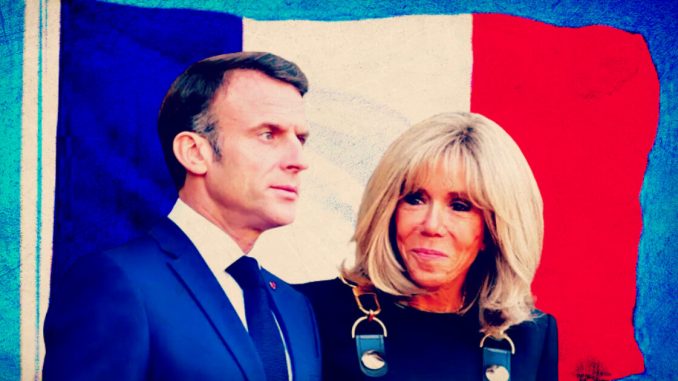
| Published July 23, 2025
Paris, France — A legal and cultural storm has erupted between France and the United States as President Emmanuel Macron and First Lady Brigitte Macron have filed a defamation lawsuit against American political commentator Candace Owens. The dispute centers on Owens’ public claims suggesting that Brigitte Macron was born male — a rumor that has long circulated in fringe circles but has now reached a courtroom in France.
The Macrons allege that Owens’ recent online content — including videos and social media posts — intentionally defamed France’s First Lady by perpetuating false claims about her gender identity. The couple filed the lawsuit in a Paris court, invoking stringent defamation laws that are much more robust than those in the United States.
The case marks a rare instance of a sitting head of state and their spouse taking legal action against a foreign media figure, underscoring the seriousness with which the French presidency views the allegations. The Macrons are seeking damages and a formal retraction.
Owens, a high-profile conservative figure known for her controversial takes on race, gender, and politics, doubled down on her claims in recent weeks, referencing unverified reports and speculating on Brigitte Macron’s past. She has framed the lawsuit as a free speech issue, calling it “a political persecution” and accusing the French government of attempting to silence dissent. She also said she looks forward to the opportunity to “present the truth in court.”

Brigitte Macron stands at her husband’s side at the Place de la Concore in Paris, on July 14

Candance Owens aired a false theory claiming Ms Macron was born a man

The claims were aired on social media before Ms Macron took legal action
However, the French legal system offers little leeway for unproven personal accusations, particularly those that damage reputation or imply false identity. In 2022, Brigitte Macron successfully won a court ruling against two individuals who spread the same claim. That ruling stated explicitly that there was “no factual basis” to the allegation that she was born male.
French officials view the current claims as part of a broader trend of imported online misinformation and American-style culture war rhetoric seeping into European discourse. One source close to the administration stated, “This is not about politics — it is about defending human dignity and truth.”
Meanwhile, Owens argues that her statements are protected under free speech and frames the legal action as censorship. Her supporters question whether this case could set a precedent for foreign nationals being prosecuted for online speech outside the jurisdiction where the alleged defamation occurred.

France’s President Emmanuel Macron and his wife Brigitte Macron wave at the Presidential Palace in Hanoi on May 26, 2025

French President Emmanuel Macron and his wife Brigitte Macron arrive at Downing Street on July 9, 2025 in London, England

The girl with a pudding bowl haircut sitting on her mother’s knee is Brigitte Trogneux. Her family are renowned chocolatiers and confectioners in the Amiens region of northern France
This legal battle may test the boundaries of international accountability in the digital age. Can a public figure in one country be held responsible under another nation’s laws for what they post online? And can a country’s leaders successfully pursue defamation claims across borders in the name of personal dignity?
With proceedings underway, the outcome of this case could have lasting implications not just for global speech norms, but also for how reputations are defended in a hyperconnected world.
 Implications:
Implications:
1. International Free Speech vs. Defamation Laws
-
Free speech protections in the U.S. allow public figures to be criticized and speculated on, even offensively — but France has stricter defamation laws that prioritize reputation and dignity.
-
This case raises the question: Can an American be held legally accountable under French law for statements made online, from U.S. soil?
-
A ruling in favor of the Macrons could set a precedent for cross-border legal claims against influencers, journalists, and commentators — blurring the jurisdiction of national speech protections.
2. Growing Conflict Between Western Legal Standards
-
The case highlights the legal clash between American and European norms, especially around online speech, disinformation, and personal privacy.
-
It may fuel debate about whether countries should harmonize online speech laws or continue enforcing them based on national borders — something becoming harder to control in the global digital space.
3. Risk to Influencers and Independent Media
-
If Owens is found liable in a foreign court, it could open the door for more lawsuits against American influencers by international political figures, corporations, or celebrities.
-
Content creators may need to rethink how they report on foreign public figures, especially when dealing with unverified claims or rumors.
4. Legal Tools for Combating Online Misinformation
-
Governments and public figures may increasingly turn to libel and defamation courts to respond to viral rumors, especially those involving identity and personal history.
-
This could lead to an uptick in international legal enforcement — even as platforms like YouTube, X (formerly Twitter), and others struggle to moderate cross-border speech violations.
5. Political Polarization and Culture War Exportation
-
The lawsuit exposes how American-style culture wars are being exported through global platforms, reaching political leaders abroad.
-
France’s leadership sees this as an unwanted intrusion of disinformation and ideology, while Owens and her base may interpret it as an attack on conservative values and free expression.
6. Media Ethics and Responsibility
-
This case also puts a spotlight on media ethics — especially in the age of viral rumors.
-
It may renew calls for stricter fact-checking, accountability, and editorial standards in influencer-driven news or commentary channels.
 Overall Takeaway:
Overall Takeaway:
The lawsuit filed by Emmanuel and Brigitte Macron against Candace Owens is more than a personal legal battle — it is a flashpoint in the growing tension between national dignity and global free speech. As social media erases borders, the case underscores the challenges of protecting reputations in a world where viral claims travel faster than facts — and where one country’s defamation is another’s protected opinion.
Whether the Macrons succeed in court or not, the outcome will reverberate far beyond France. It will test the reach of international law in the digital age, redefine how online influencers engage with foreign political figures, and possibly open the door to similar cross-border lawsuits in the future.
At its core, this case is not just about one rumor — it’s about truth, accountability, and who gets to draw the line in a globalized information war.
SOURCES: THE GATEWAY PUNDIT – Emmanuel and Brigitte Macron Sue American Political Commentator Candace Owens for Saying First Lady of France Was Born a Man
REUTERS – French president Macron sues influencer over claim France’s first lady was born male
THE HILL – Macrons file lawsuit against Candace Owens over comments about French first lady





Be the first to comment